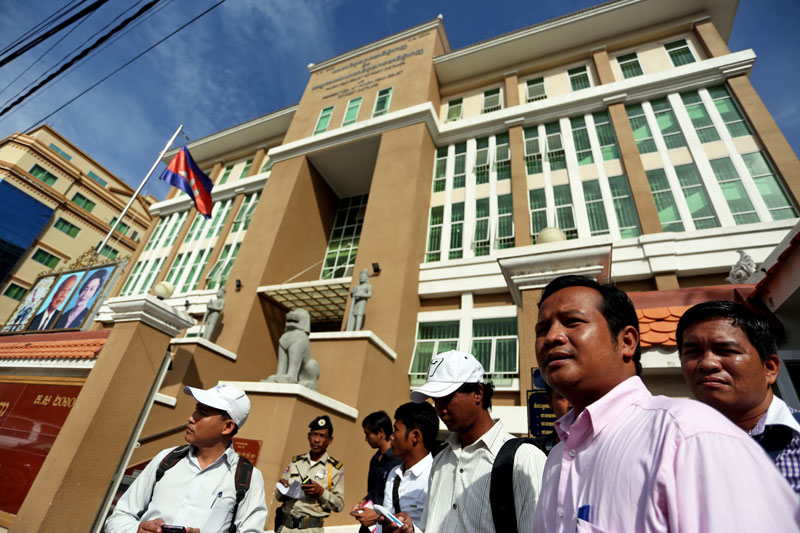Pav Sina, president of the Collective Union of Movement of Workers, was placed under judicial supervision by the Phnom Penh Municipal Court on Friday for his alleged role in garment sector protests in December and January, some of which turned violent before being lethally suppressed by government forces.
The ruling comes just days before the planned launch of a campaign by Mr. Sina and other unions to demand the minimum wage in the garment sector be raised from $100 to $177, set to begin on September 17.

Investigating Judge Chea Sokheang, citing charges of intentional violence, threats, destroying property and obstructing traffic, ruled that Mr. Sina would be monitored by the court and could not join any type of public gathering until his trial, a date for which has not been set, the union leader said after being questioning.
“The ruling means that I cannot go out of the country. I cannot join a rally, protest or any gathering and I have to report to commune police once a month,” Mr. Sina said after emerging from the questioning.
Court clerk San Sakny confirmed that Mr. Sina had been placed under judicial supervision, but said she could not recall further details of the judge’s ruling.
Speaking to reporters outside the court, Mr. Sina said that the court’s ruling was a clear attempt to stifle the planned minimum wage campaign, which comes ahead of a new minimum wage announcement due in October and currently being negotiated by the government, unions and factories.
“The accusation is simply a reason to hinder the $177 minimum wage campaign that we will hold on the 17th,” Mr. Sina said. “[The court] issued the warrant to prevent my activity and that of other union leaders.”
Fellow union leaders Ath Thorn, Yaing Sophorn, Chea Mony, Morn Nhim and Rong Chhun will also face the court in the coming week to be questioned over their roles in the wave of garment sector protests, which began late last year and ended on January 3 after military police sprayed bullets from automatic rifles into a crowd of stone-throwing protesters, killing at least five and wounding dozens more.
On Friday, some 50 supporters of Mr. Sina stood outside the court holding banners calling for brands such as H&M, GAP, Puma, Adidas and Levis, which source from Cambodia’s garment factories, to intervene in the court action against the union leaders.
Last week, Human Rights Watch released a statement condemning the charges and onslaught of court action against the union leaders.
“This is just the latest government effort to scare activists and the political opposition into dropping plans to use protests to advance their cause,” says the statement, dated September 4.
Mr. Sina said that Judge Sokheang told him on Friday that the charges came as a result of a complaint from the Garment Manufacturers Association in Cambodia (GMAC), which represents about 400 exporting factories.
Judge Sokheang could not be reached for comment Friday. GMAC secretary-general Ken Loo also could not be reached. Mr. Loo’s deputy, Kaing Monika, said he was unaware of the case.
Mr. Sina said that the Judge questioned him mostly about the events on January 3, when military police were sent in with guns raised after an overnight standoff between a group of militant protesters and authorities. He maintains that he was not on Veng Sreng Street that day.
Dave Welsh, country director of the Solidarity Center, a U.S.-based labor rights organization, said that the court’s charges could prove detrimental to a $5 billion industry that employs an estimated 600,000 people and accounts for 80 percent of total exports.
“The message that this sends to international investors is terrible,” he said. “It is very disturbing in terms of trade relations and industrial confidence.
“This comes at a time when we need to be assuring investors that minimum wage talks are being approached in a calm fashion,” Mr. Welsh added.
“This action is a very aggressive step and there is no doubt in anyone’s mind that it is linked to the wage discussions.”
(Additional reporting by Matt Blomberg)



